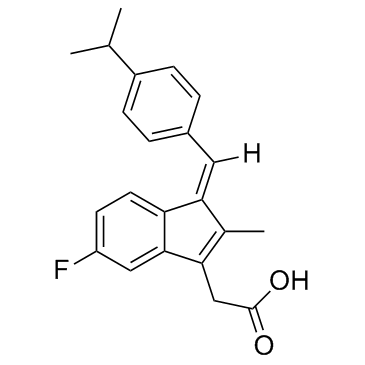| Description |
K-80003 is a potent inhibitor of tRXRα-dependent Akt activation and cancer cell growth.
|
| Related Catalog |
|
| Target |
Akt
|
| In Vitro |
When MCF-7 cells are cotreated with K-80003, TNFα-induced colocalization of tRXRα with p85α in the cytoplasm is inhibited, resulting in tRXRα nuclear localization. Western blotting shows that K-80003-stabilized tetrameric form of tRXRα is found exclusively in the nuclear fraction, while tRXRα monomer is distributed both in the nuclear and cytoplasmic fractions[2].
|
| In Vivo |
K-80003 is a potent inhibitor of AKT activation by all-trans-retinoic acid. K-80003 displays enhanced efficacy in inhibiting tRXRα-dependent AKT activation and tRXRα tumor growth in animals. K-80003 has high affinity to RXRα but lacks COX inhibitory activity[1].
|
| Cell Assay |
MCF-7 cells cotransfected with Myc-RXRα, Myc-tRXRα, tRXRα/L433D and p85α are pretreated with or without K-80003 (5 μM) for 3 h before exposed to TNFα (10 ng/mL) for 30 min. Cells are immunostained with anti-Myc and anti-p85α antibody, and their subcellular localization revealed by confocal microscopy. HEK293T cells cotransfected with Myc-tRXRα are treated with or without K-80003 (5 μM) for 6 h. Nuclear (N) and cytoplasmic (C) fractions are prepared, subjected to BS3 crosslinking, and analysed by western blotting using anti-Myc antibody. The purity of fractions is examined by analysing the expression of nuclear PARP and cytoplasmic α-tubulin in non-crosslinked fractions. One of three similar experiments is shown[2].
|
| Animal Admin |
Mice[1] Nude mice (BALB/c, 4-5-week old) are injected subcutaneously with 100 μL of cells (2×106). For drug treatment, mice (n=6) are treated intraperitoneally after 7 days of transplantation with Corn oil, Sulindac (60 mg/kg), or K-80003 (60 mg/kg) once every other day (six injections). Body weight and tumor sizes are measured every 4 days.
|
| References |
[1]. Zhou H, et al. NSAID sulindac and its analog bind RXRalpha and inhibit RXRalpha-dependent AKT signaling. Cancer Cell. 2010 Jun 15;17(6):560-73. [2]. Chen L, et al. Modulation of nongenomic activation of PI3K signalling by tetramerization of N-terminally-cleaved RXRα. Nat Commun. 2017 Jul 17;8:16066.
|
